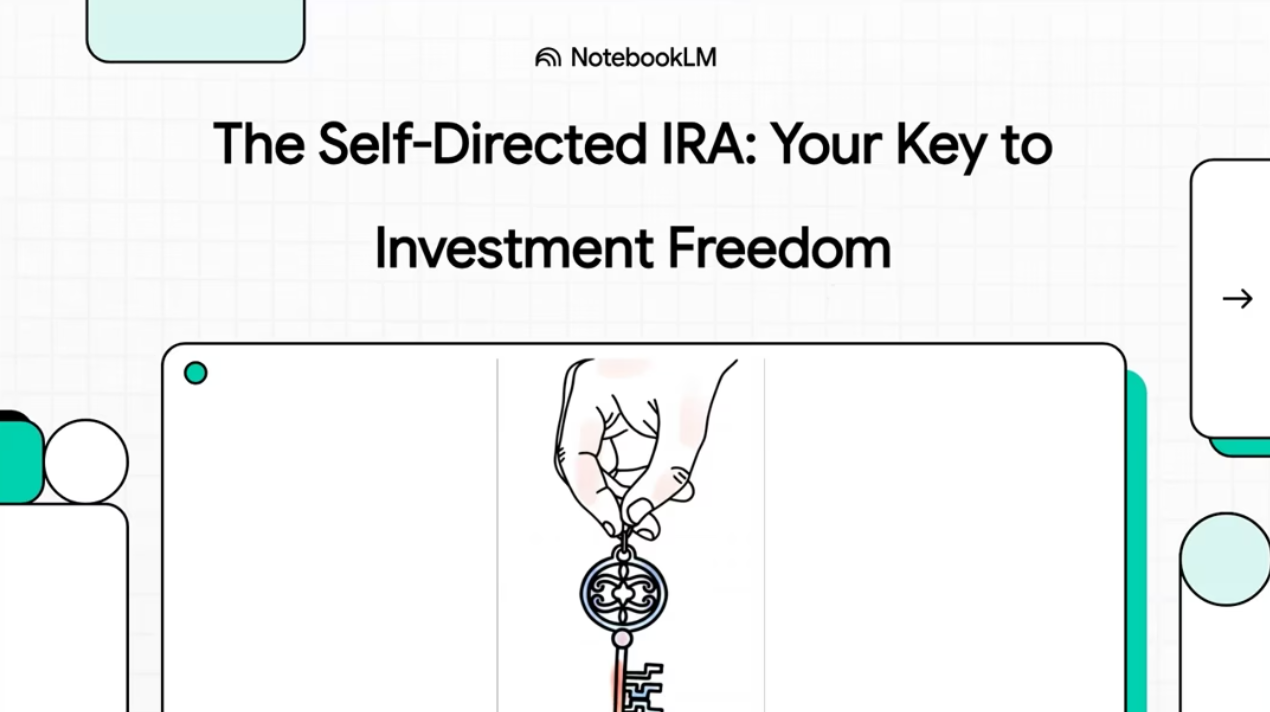What is the Best State for My IRA LLC?

A common question for someone considering the formation of a Checkbook IRA LLC is: “What is the best state to form the LLC in?”
It’s a good question, and one that merits some consideration before putting a plan in place and starting to invest. It’s also a question for which there is no one good answer.
The needs of each investor will vary based on their own location, what types of investments they intend to make, where investments will be located, and if a personal move across state lines may be on the horizon.
Let’s take some time to evaluate a few of the key factors that may help determine which state is best for an IRA LLC.
The Purpose of the LLC
The primary purpose of the LLC component of an IRA LLC is to put the IRA account holder in control of their IRA funds. The LLC is configured in a special way so that the IRA can be the member with ownership equity, and the IRA account holder can act as a non-owner manager.
As a result, the investment activities of the LLC fall under the tax umbrella of the IRA, but can be administered by the account holder. This is why the structure is said to provide checkbook control.
This level of control can be achieved with a LLC formed under the laws of any state.
So why don’t we always use the state with the simplest filing requirements and the lowest formation and annual maintenance fees?
A secondary purpose of the LLC is to provide asset protection for the IRA and the IRA account holder. LLC stands for Limited Liability Company, and the laws of all states afford varying degrees of legal insulation to protect LLC owners from lawsuits against the entity.
In that case, would it make sense to form the LLC in a state with very strong LLC protections like Delaware?
For an investor with operations in Delaware or in multiple states, this might make sense. For an investor looking to hold a rental property in Colorado, however, that Delaware LLC will not do much good in a lawsuit unless it has also registered in or formed a subsidiary in Colorado.
Nexus, Nexus, Nexus
Typically, the most important consideration for the formation of an IRA LLC is business nexus. Where will the investments be taking place, and do those investments classify as having business nexus with the state?
Owning income-producing property or lending to residential homeowners are activities that will generally be considered to produce nexus. In a case where nexus exists, an LLC must have a registration footprint in that state in order to be compliant with state law for operating in the state.
This registration also grants the LLC legal standing with the state, so the LLC can pursue and defend matters before the courts.
Operating in a state where nexus exists without having the appropriate registration can result in administrative penalties as well as loss of the liability protections afforded to LLC entities.
Registration can be accomplished by forming the LLC in that state, or registering as a foreign entity to do business in another state if the LLC is initially formed elsewhere.
Non-Nexus Activities
Many investments made with a checkbook IRA don’t create nexus. These activities are generally perceived as asset holdings, and do not necessarily require state registration.
Examples might include:
- Conventional financial products like stocks or funds
- Private placements, real estate syndications, and other investments that consist of purchasing ownership in another legal entity
- Stock of privately held corporations
- Foreign real estate
- Cryptocurrencies
- Raw land held for appreciation only
- Lending to commercial borrowers (depending on the state)
When no nexus exists the question then becomes: “How simple is it to setup and maintain a LLC in your state of residence?” Establishing a LLC in your home state is generally simple and gives you the option to act at the registered agent for the LLC — being a physical in-state address for delivery of a court summons or other official notice.
Some states have more complex filing and annual reporting requirements, or particularly high annual re-registration fees for LLC entities. In this case, if you are not doing business in the state, it may be advantageous to register elsewhere or utilize an IRA trust instead of an IRA LLC.
Asset Protection Focus
For an investor with a large portfolio and an investment strategy that creates nexus in multiple states, forming the master IRA-owned LLC in Delaware, then having foreign entity registration or land trusts where the Delaware LLC is the grantor/beneficiary in individual states where properties are held could be worth the cost of setting up and maintaining such a structure.
For most investors, such a strategy would be overkill. Forming the LLC in the primary state where investments creating nexus will take place, then obtaining quality landlord and liability insurance for that LLC is likely more than sufficient and more cost effective.
Efficiency Focus
When a portfolio is unlikely to create nexus or liability exposure, simplicity of operation and minimal maintenance become primary considerations. Often times forming a LLC in your home state will be the easiest bet, unless you live in a handful of states with requirements for complex annual filings or high fees.
Massachusetts, Tennessee, Nevada, and California are some states where “somewhere else” may be a good answer.
Missouri is a great state for LLC formation in these cases. The filing process is quick and simple. No personal information needs to be in the public record, so there is a layer of anonymity.
There is no state required annual report or filing fee. If you’re not a resident of Missouri, you simply need to hire a 3rd party to act as registered agent and provide an in-state address for official notices.
That can be done for as little as $50 per year. Compare that to annual filings in Massachusetts of $500 or Nevada at $425 and Missouri becomes a pretty easy decision.
Thinking Ahead
Your investment portfolio may change over time. We speak with a lot of investors who may be starting out with alternative assets and only thinking about a few non-nexus investments like a private note fund or real estate syndication.
As their portfolio grows, however, they have an intention of adding some directly owned rental property into the mix.
If you live in Kentucky and plan to invest locally in the future, it may make more sense to form a LLC in Kentucky than a lower cost option like Missouri, even though annual operating costs in Kentucky will be $140 more per year initially.
Situations Change
While it is beneficial to spend some time evaluating the best state in which to setup your IRA owned LLC, don’t get caught in an endless game of “what if?”
Life changes. Investment goals change. The more you network, the broader your investment options become.
It may be that in the future you need to modify your IRA LLC structure and extend to or move to another state. Such actions are generally not too burdensome in terms of paperwork or expense. In a future article, we’ll discuss how to alter an IRA LLC as circumstances change.
What our clients says about us
Quick answers to common questions
We’ll take you through a simple, step by step process designed to put your investment future into your own hands…immediately. Everything is handled on a turn-key basis. You take 100% control of your Retirement funds legally and without a taxable distribution.
YES! In 1974, Congress passed the Employee Retirement Income Security Act (ERISA) making IRA, 401(k) and other retirement plans possible. Only two types of investments are excluded under ERISA and IRS Codes: Life Insurance Contracts and Collectibles (art, jewelry, etc.). Everything else is fair game. IRS CodeSec. 401 IRC 408(a) (3)
It’s actually pretty simple. Early on, regulators let the securities industry take the lead in educating the public about retirement accounts. Naturally, brokers and banks promoted stocks, bonds, and mutual funds—giving the impression that those were the only allowed investments. That was never true... and still isn’t. You can probably guess why they kept the rest under wraps.
It is possible to use funds from most types of retirement accounts:
- Traditional IRA
- Roth IRA
- SEP IRA
- SIMPLE IRA
- Keogh
- 401(k)
- 403(b)
- Profit Sharing Plans
- Qualified Annuities
- Money Purchase Plans
- and many more.
It must be noted that most employer sponsored plans such as a 401(k) will not allow you to roll youraccount into a new Self-Directed IRA plan while you are still employed. However, some employers will allow you to roll a portion of your funds. The only way to be completely sure whether your funds are eligible for a rollover is by contacting your current 401(k) provider.
A Solo 401(k) requires a sponsoring employer in the format of an owner-only business. If you have a for-profit business activity – whether as your main income or as a side venture – and have no full-time employees other than potentially your spouse, your business may qualify. The business may be a sole-proprietorship, LLC, corporation or other entity type.
A self-directed retirement plan is a type of IRA or 401(k) that gives you greater control over how your retirement funds are invested. Unlike traditional accounts held at banks or brokerage firms that limit you to stocks, bonds, and mutual funds, self-directed plans allow you to invest in a wide range of alternative assets including real estate, private businesses, precious metals, cryptocurrency, and more.
These plans still follow the same IRS rules and maintain the same tax-deferred or tax-free benefits as conventional retirement accounts. The difference is simply in how and where you choose to invest.
No. Moving to a self-directed IRA or Solo 401(k) does not trigger any taxes, as long as your funds are eligible for rollover.
Self-directed retirement plans maintain the same tax-advantaged status as traditional plans offered by banks or brokerage firms. The key difference is flexibility—our plans are designed to give you greater control and allow for a wider range of alternative investments beyond stocks, bonds, and mutual funds.
A prohibited transaction is any action between your retirement plan and a disqualified person that violates IRS rules and can lead to serious tax consequences. Under IRS Code 4975(c)(1), prohibited transactions include:
- Selling or leasing property between your plan and a disqualified person Example: Your IRA cannot purchase a property you already own.
- Lending money or extending credit between the plan and a disqualified person Example: You cannot personally guarantee a loan your IRA uses to buy real estate.
- Providing goods or services between your plan and a disqualified person Example: You can’t use your personal furniture to furnish a rental property owned by your IRA.
- Using plan income or assets for the benefit of a disqualified person Example: Your IRA cannot buy a vacation home that you or your family use.
- Self-dealing by a fiduciary (using plan assets for their own benefit) Example: Your CPA shouldn't loan your IRA money if they’re advising the plan.
- Receiving personal benefit from a deal involving your IRA's assets Example: You can’t pay yourself from profits your IRA earns on a rental.
If a transaction doesn’t clearly fall within the allowed guidelines, the IRS or Department of Labor may review the situation to determine if it qualifies as a prohibited transaction.
Disqualified persons are individuals or entities that are prohibited from engaging in certain transactions with your IRA or 401(k). Doing so could trigger a prohibited transaction, which may result in taxes and penalties.
Here’s who is considered a disqualified person:
- You (the account holder)
- Your spouse
- Your parents, grandparents, and other ancestors
- Your children, grandchildren, and their spouses
- Any advisor or fiduciary to the plan
- Any business or entity owned 50% or more by you or another disqualified person, or where you have decision-making authority
These rules exist to prevent self-dealing and ensure your retirement plan remains in compliance with IRS regulations.
(Reference: IRC 4975)
Understanding and following these rules can be tricky, but it’s very doable. The best way to stay compliant is to work with professionals who specialize in self-directed retirement plans. They can help you navigate IRS guidelines and avoid prohibited transactions.
If an IRA holder is found to have engaged in a prohibited transaction with IRA funds, it will result in a distribution of the IRA. The taxes and penalties are severe and are applicable to all of the IRA’s assets on the first day of the year in which the prohibited transaction occurred.
Yes. While self-directed retirement plans allow for a wide range of investments, there are a few important restrictions.
You cannot invest in collectibles or life insurance contracts, and you must avoid prohibited transactions—activities that benefit you personally rather than the retirement plan. These include things like buying or selling property to yourself or family members, using plan assets for personal gain, or self-dealing in any way.
Violating these rules could cause your entire IRA to lose its tax-advantaged status. To protect your account, it’s essential to work with professionals who understand IRS regulations and can help you stay compliant.
This is a common misconception. In many cases, professionals may simply be unfamiliar with self-directed retirement plans, as they fall outside their usual scope of work. CPAs and tax preparers are trained to file taxes, not necessarily to advise on alternative retirement strategies. Financial advisors and brokers often work for firms that focus on traditional investments like stocks and mutual funds—and may not benefit from or support alternative options like real estate or private lending.
Self-directed retirement investing is legal under IRS rules—but like any specialized area, it requires working with professionals who understand how it works.
The IRS has rules in place to make sure your IRA is used only for the exclusive benefit of the retirement account—not for personal gain or to help family members. These rules can get complicated because there are many ways a conflict of interest can occur, even unintentionally.
For example, if your IRA buys a house and rents it to your mother, you might be reluctant to evict her if she stops paying rent. That emotional connection creates a conflict between what’s best for your IRA and your personal relationships, something the IRS aims to prevent.
These rules help ensure your retirement account stays compliant and protected. (See IRC 408)
Yes. Most tax-deferred retirement accounts—such as Traditional IRAs, old 401(k)s, 403(b)s, and TSPs—can be rolled over into a self-directed IRA or Solo 401(k), depending on your eligibility. Roth IRAs cannot be rolled into these accounts.
You can contribute directly from earned income, subject to annual IRS contribution limits. The method and amount depend on the type of plan you have (e.g., Solo 401(k) vs. IRA).
To take a distribution, you'll request funds through your custodian or plan administrator. Distributions may be taxable depending on your account type and age. Early withdrawals may be subject to penalties.
For 2025, the Solo 401(k) max contribution limit is $81,250 if age 60-63, $77,500 if age 50-59 or 69+, and $70,000 if under 50. Traditional and Roth IRAs have a limit of $7,000 ($8,000 if age 50+). Limits are subject to IRS adjustments.
Yes. IRA contributions are typically due by your personal tax filing deadline (e.g., April 15). Solo 401(k) contributions follow your business tax filing deadline, including extensions.
IRS reporting requirements vary depending on the type of self-directed retirement plan you have. Here’s a quick breakdown of what you need to know
Please note: Our team can help you understand what’s required for your specific account, but we don’t provide tax or legal advice. We always recommend working with a qualified tax professional to ensure full IRS compliance.
Self-Directed IRA (Traditional or Roth)
- Form 5498 – Filed by your custodian each year to report contributions, rollovers, and the fair market value (FMV) of your account.
- Form 1099-R – Issued if you take a distribution or move funds out of your IRA.
- Annual Valuation – You'll need to provide updated FMV for any alternative assets held in the account, such as real estate or private placements.
Solo 401(k)
- Form 5500-EZ – Required if your plan assets exceed $250,000 as of year-end. Must be filed annually by the plan participant.
- Form 1099-R – Required if you take a distribution or roll funds out of the plan.
- Contribution Tracking – Keep records of employee and employer contributions. These are not filed with the IRS but may be needed for tax reporting or audits.
SEP IRA
- Form 5498 – Filed by your custodian to report contributions and FMV.
- Form 1099-R – Filed by your custodian. Issued for any distributions.
- Employer Contributions – Must be reported on your business tax return (and on employee W-2s, if applicable).
Health Savings Account (HSA)
- Form 5498-SA – Filed by your HSA custodian to report contributions.
- Form 1099-SA – Filed by your HAS custodian. Issued for any distributions.
- Form 8889 – Must be included with your personal tax return to report contributions, distributions, and how funds were used.







